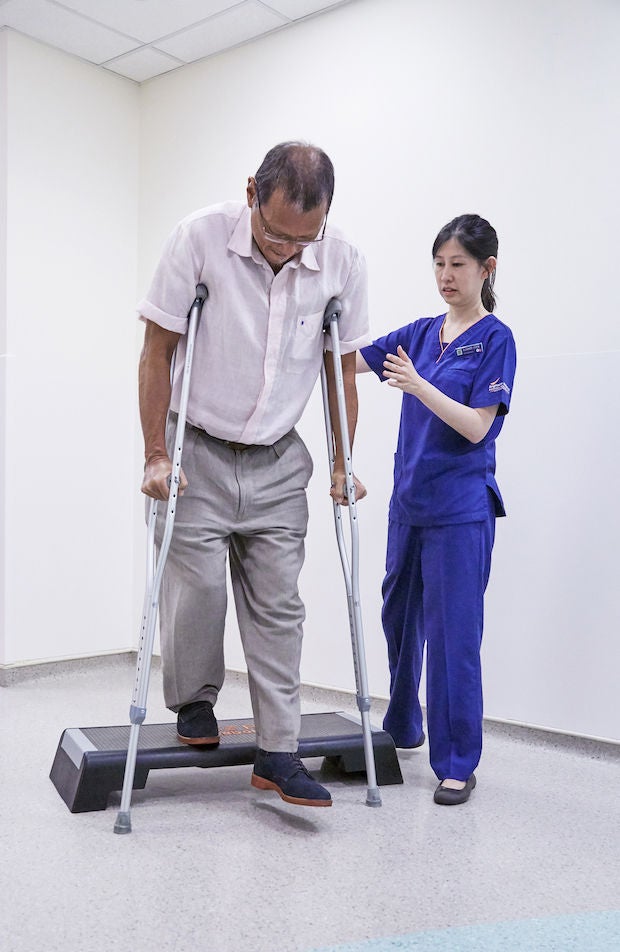
<<Mr Lionel Liew (above with Physiotherapist Eleanor Chew) underwent an enhanced recovery programme that enabled him to be discharged within 23 hours of his hip replacement surgery.>>
Hours after Mr Lionel Liew underwent hip replacement surgery at Singapore General Hospital (SGH), he was able to get up by himself and start walking. The former national water polo player was discharged and could climb the stairs at home later the same day.
Usually, hip replacement patients need to recuperate in hospital for four to five days before discharge. The shortened recovery time for Mr Liew was possible because of a new enhanced recovery programme the hospital piloted in January 2019, and officially launched a year later.
“Same-day discharge after a total hip replacement may sound far-fetched as patients usually stay in bed for a few days after major surgery. We wanted patients to have the benefits of same-day discharge,” said Dr Pang Hee Nee, Consultant, Department of Orthopaedic Surgery, SGH, and programme lead.
Under the plan, patients attend a newly introduced Joint Replacement Class on the day they visit the Pre- Admission Centre to undergo pre-operative tests. At the class, a multidisciplinary team gives them pre-surgery instructions, and teaches them pain management, wound care, diet and nutrition, and rehabilitation exercises. The team includes an orthopaedic-trained advanced practice nurse, physiotherapist, and occupational therapist.
Not all patients are suitable for the programme. They have to be generally fit, able to perform normal daily activities, and have good family support.
Patients undergo a minimally invasive surgical technique that avoids cutting into the muscles. The technique involves stretching the thigh muscles apart to get to the damaged hip joint. SGH started using this direct anterior approach in 2015.

<<Mr Liew
(second from left,
with Ms Chew,
Dr Pang Hee Nee,
and Advanced
Practice Nurse
Rajashulakshana
Rajaram in January
2020) was able to
start walking after his
anaesthesia wore off.>>
Like Mr Liew, patients under the pilot programme were able to start walking once they felt well enough. “As soon as the anaesthesia wears off, patients are encouraged to get off the bed to walk. Doing so lowers their risk of possible post-surgery complications, such as blood clots, and patients can go home earlier with a smaller bill,” said Dr Pang.
About 80 per cent of the 30 patients recruited for the pilot programme were discharged within 23 hours of being reviewed by the care team. Before they returned for follow-up review with the surgeon, they received a couple of home visits by physiotherapists and community nurses in the first two weeks to assess their recovery. Patients could also call a helpline.
“Having physiotherapists make home visits reassured patients that they continued to receive care after discharge. This makes them feel more confident going back home,” said Dr Pang.
“A lot of patients are not confident about going out once they are home. For instance, they worry about lift doors closing as they enter,” added Ms Eleanor Chew, Physiotherapist.
Going to patients’ homes also gave physiotherapists a better sense of the issues patients face at home and how they can overcome them.
“We can simulate the home environment in hospital, but it is in patients’ homes that we can fully understand the issues they may face — if they are climbing the stairs safely, for example,” Ms Chew said.
This type of post-surgery care, together with the advice he received from his physiotherapist and occupational therapist before surgery, prepared Mr Liew mentally for what was to come after his operation. “They were all very helpful in walking me through the process. They taught me exercises I needed to do after the surgery. I found the home therapy exercises very useful,” he said.
An average of 300 patients undergo total hip replacement at SGH each year, and about half of them will benefit from the enhanced recovery programme.













 Get it on Google Play
Get it on Google Play